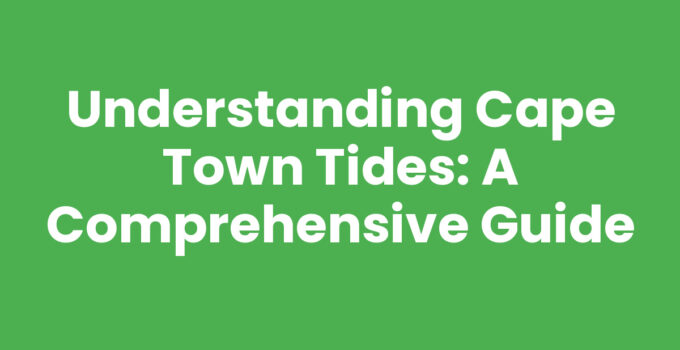Cape Town, with its stunning coastline and vibrant marine life, is one of the most popular destinations for both locals and tourists. Understanding the tides in this beautiful city is essential for anyone looking to enjoy water activities such as fishing, surfing, or beachcombing. In this detailed guide, we will dive deep into the topic of Cape Town tides, discussing their patterns, why they matter, and how to read tide tables effectively.
Cape Town Tides: A Comprehensive Overview
The tides of Cape Town are influenced by several factors, including the gravitational pull of the moon and the sun, as well as local geographical conditions. The city experiences semidiurnal tides, meaning there are typically two high tides and two low tides every lunar day. This section will provide you with a thorough understanding of how to read and interpret the tides.
Understanding Tidal Patterns
In Cape Town, the tidal patterns can differ greatly depending on the time of year and the phase of the moon. Here’s how you can make sense of them:
- Reading Tide Tables: Tide tables provide crucial information about the expected times of high and low tides as well as their height. You can find this information on various websites or offshore apps dedicated to marine forecasts.
- Timing Your Activities: Depending on what you’re planning to do, knowing the tide times is vital. For example, if you’re planning to surf, you’ll want to catch the tide when it’s most favorable for waves.
- Monitoring the Moon Phases: The height of tides can vary according to the moon phases. New moons and full moons generally result in higher high tides and lower low tides, a phenomenon known as “spring tides.” Conversely, during the first and last quarter moons, the high tides will be lower and the low tides higher, known as “neap tides.”
In Cape Town, the tidal range can also change due to wind direction and atmospheric pressure, modifying your planned activities.
Benefits of Understanding Cape Town Tides
Knowing about tides can enhance your coastal experience in many ways:
- Enhanced Safety: Knowing when to expect high and low tides can ensure that you stay safe while enjoying coastal explorations.
- Improved Fishing Opportunities: Understanding when fish are more active can lead to a more successful fishing trip.
- Enjoying Water Sports: Surfing, kayaking, and swimming all depend significantly on the tide conditions, making it essential to plan accordingly.
This knowledge not only enhances your personal experiences but also promotes responsible interaction with marine environments.
Important Considerations for Cape Town Tides
When planning activities around Cape Town tides, consider the following:
- Local Guides: If you’re unfamiliar with the area, it may be beneficial to hire a local guide who can provide insights and enhance your understanding of tidal behavior.
- Impact of Weather Conditions: Changes in weather can significantly alter tidal conditions. Always check forecasts before heading out to ensure you’re prepared for any shifts.
- Environmental Awareness: Be aware of tide pools and coastal ecosystems; respect wildlife and always leave nature as you found it.
In summary, understanding Cape Town’s tides can greatly enhance your coastal experiences, providing safety and boosting enjoyment in outdoor activities. By keeping track of tidal patterns, you can ensure that each trip to the beautiful Cape coast is both enjoyable and safe.
Conclusion
Getting familiar with the Cape Town tides not only assists in planning enjoyable beach outings but also contributes to greater environmental appreciation and safety. Whether you’re an avid surfer or simply looking to enjoy a day at the beach, understanding these natural rhythms is invaluable. With this guide, you can make the most of your adventures in Cape Town!
Frequently Asked Questions
What time do tides change in Cape Town?
Tides in Cape Town typically change every 6 hours, but exact times can vary based on the lunar cycle and weather conditions.
What is the best time for fishing in Cape Town?
The best times for fishing align with high tides, especially during dawn and dusk when fish are more active.
How can I access Cape Town tide tables?
You can find Cape Town tide tables on various marine forecasting websites or mobile apps dedicated to tides and ocean conditions.



